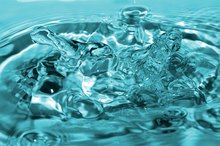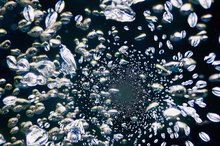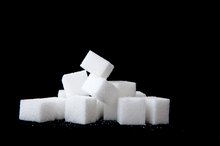What Is the Solubility of Sucrose?
Sucrose is the chemical name for what's more commonly called table sugar. If you're curious as to whether sucrose is soluble in water -- and how soluble -- the answer is that it dissolves quite well. This is why it's possible to make syrups from sucrose and water.
Sucrose
The sucrose molecule is one of many different sugars that make up your diet. Sugars like sucrose are carbohydrates, falling into the same nutrient molecule category as starch, even though sugars are sweet and starch is not. Sucrose is a disaccharide, which means it's made up of two smaller sugar units called monosaccharides. Specifically, these monosaccharides are called glucose and fructose.
- The sucrose molecule is one of many different sugars that make up your diet.
- Sugars like sucrose are carbohydrates, falling into the same nutrient molecule category as starch, even though sugars are sweet and starch is not.
Sucrose In Water
What Is the pH of D.I. water?
Learn More
Sucrose is very water soluble. Specifically, you can dissolve 2000 g of sucrose -- nearly a pound -- in a liter of water at room temperature, according to the "CRC Handbook of Chemistry and Physics." The reason you can dissolve so much sucrose in water is that the sucrose molecule is highly polar 2. This means that the atoms that make up sucrose don't have full chemical charges, but do have partial charges; this increases attraction of a molecule for water.
- Sucrose is very water soluble.
- This means that the atoms that make up sucrose don't have full chemical charges, but do have partial charges; this increases attraction of a molecule for water.
Solubility Issues
Like almost all solids, you can dissolve more sucrose in warm water than you can in cool water. For instance, if you've ever made simple syrup -- a syrup made by saturating water with sugar -- you'll recall that you needed to boil the water as you stirred in the sucrose. The purpose of this is to enhance the solubility of the sucrose and to get more of it to dissolve in water in a timely manner, without an excessive amount of stirring.
Precipitation
Sorbitol Vs. Mannitol
Learn More
Because the solubility of sucrose in water is temperature-dependent, if you make a solution of sugar and water at high temperature, you can sometimes produce a solution that contains too much sugar for the quantity of water at a lower temperature. If this happens, you'll notice that when the temperature of your solution falls, the solution will become cloudy. This is the extra sucrose precipitating, or "falling" out of solution. The sugar will re-dissolve when the solution is heated.
- Because the solubility of sucrose in water is temperature-dependent, if you make a solution of sugar and water at high temperature, you can sometimes produce a solution that contains too much sugar for the quantity of water at a lower temperature.
- If this happens, you'll notice that when the temperature of your solution falls, the solution will become cloudy.
Related Articles
References
- “Biochemistry”; Reginald Garrett, Ph.D. and Charles Grisham, Ph.D.; 2007
- "CRC Handbook of Chemistry and Physics"; David Lide; 1974
Writer Bio
Kirstin Hendrickson is a writer, teacher, coach, athlete and author of the textbook "Chemistry In The World." She's been teaching and writing about health, wellness and nutrition for more than 10 years. She has a Bachelor of Science in zoology, a Bachelor of Science in psychology, a Master of Science in chemistry and a doctoral degree in bioorganic chemistry.









